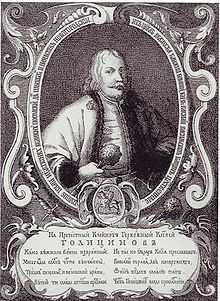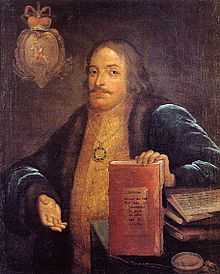Vasily Vasilyevich Galitzine


Prince Vasily Vasilyevich Galitzine (Василий Васильевич Голицын; 1643–1714) was a Russian aristocrat and statesman of the 17th century. He belonged to the Galitzine family and his main political opponent was his cousin Prince Boris Alexeyevich Galitzine.
Life
He spent his early days at the court of Tsar Alexius where he gradually rose to the rank of boyar. In 1676 he was sent to Ukraine to keep in order the Crimean Tatars and took part in the Chigirin campaign. Personal experience of the inconveniences and dangers of the prevailing system of preferment; the so-called mestnichestvo, or rank priority, which had paralyzed the Russian armies for centuries, induced him to propose its abolition, which was accomplished by Tsar Feodor III in 1678.
The May revolution of 1682 placed Vasily at the head of the Posolsky Prikaz, or ministry of foreign affairs, and during the regency of Sophia, sister of Peter the Great, whose intimate friend he became, he was the principal minister of state (1682–1689) and keeper of the great seal, a title bestowed upon only two Russians before him, Afanasy Ordin-Nashchokin and Artamon Matveev. In home affairs his influence was insignificant, but his foreign policy was distinguished by the Treaty of Nerchinsk (1689), which set the Russo-Chinese border north of the Amur River, and by the peace with Poland (1683), whereby Russia at last recovered Kiev. By the terms of the same treaty, he acceded to the grand league against the Porte, but his two expeditions against the Crimea (Crimean campaigns of 1687 and 1689) were unsuccessful and made him extremely unpopular.
Only with the utmost difficulty could Sophia get the young tsar Peter to decorate the defeated commander-in-chief as if he had returned a victor. In the civil war between Sophia and Peter (August–September 1689), Galitzine half-heartedly supported his mistress and shared her ruin. His life was spared owing to the supplications of his cousin Boris, but he was deprived of his boyardom, his estates were confiscated and he was banished successively to Kargopol, Mezen and Kholmogory, where he died on 21 April 1714.
Galitzine was unusually well educated. He was a great friend of foreigners, who generally alluded to him as the great Galitzine. He expounded to them some drastic reform measures, such as the abolition of serfdom, the promotion of religious toleration, and the development of industrial enterprises. As Galitzine was eager to avoid all forms of violence and repression, his program was more cautious and realistic than that of Peter the Great. Political upheavals prevented him from executing any of these plans.